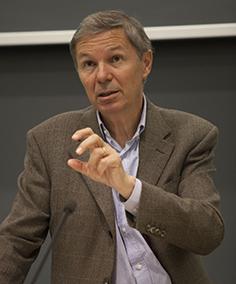What's Next in Syria?
Former U.N. Deputy Special Envoy Jean-Marie Guéhenno, Director of the Center for International Conflict Resolution at Columbia University's School of International and Public Affairs, Assesses Prospects for Syria in a Presentation at Columbia Law School
New York, September 27, 2013—The situation in Syria is deteriorating and threatens to ignite a catastrophic regional conflict, said Jean-Marie Guéhenno, director of the Center for International Conflict Resolution at Columbia University’s School of International and Public Affairs and former United Nations Under-Secretary-General for Peacekeeping Operations, in a Sept. 23 presentation at Columbia Law School.
| Professor Jean-Marie Guéhenno |
For five months in 2012, Guéhenno worked closely with former U.N. Secretary-General Kofi Annan in Syria as Deputy Joint Special Envoy of the U.N. and the Arab League for Syria. He spoke at the Law School last fall, expressing doubt that Bashar al-Assad and opposition groups would reach a negotiated settlement. A year later, he said, the Syrian civil war has only gotten worse, and the Security Council will need to take a bigger role in shaping a solution.
“It’s a problem of who can sit at the negotiating table in a practical way,” Guéhenno said. “It was already difficult for the opposition to develop a common position when I was working with Kofi Annan, and the divisions have deepened now.”
Guéhenno explained that substantive policy differences and varying self-interests among members of the U.N. Security Council have made coordinated action difficult, and that negotiations about the regime’s chemical weapons might not achieve much.
“An agreement between the United States and Russia on chemical weapons can only be a start,” Guéhenno said. “To arrange for the destruction of chemical weapons in the middle of a raging civil war is a tall order, to put it mildly.”
As the death toll mounts, the opposition has become increasingly fragmented and radicalized, further complicating the situation on the ground and strengthening al-Assad’s hand, Guéhenno said. He warned that the conflict could spread beyond Syria and threaten regional stability.
“Further fragmentation of Syria, spilling over to other countries with regional wars that could redraw the map, would mean killing on an even bigger scale. It would be a catastrophic event,” he said.
Guéhenno expressed guarded optimism that the international community, including Russia and China, is realizing that it’s in their best interest to contain the situation in Syria.
“A deepening crisis can focus the mind,” he said.
Guéhenno’s presentation included comments from Visiting Professor of Law and former Legal Adviser to the U.K. Foreign & Commonwealth Office Sir Daniel Bethlehem and Michael Doyle, the Harold Brown Professor of International Affairs, Law, and Political Science and co-chair of the Center on Global Governance.
